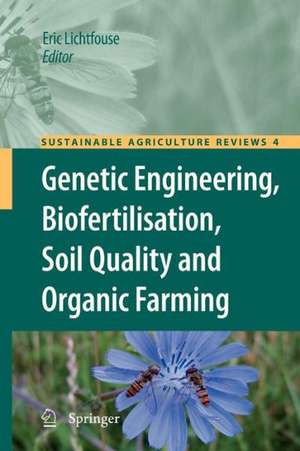Genetic Engineering, Biofertilisation, Soil Quality and Organic Farming: Sustainable Agriculture Reviews, cartea 4
Editat de Eric Lichtfouseen Limba Engleză Paperback – 5 sep 2012
| Toate formatele și edițiile | Preț | Express |
|---|---|---|
| Paperback (1) | 1046.72 lei 38-45 zile | |
| SPRINGER NETHERLANDS – 5 sep 2012 | 1046.72 lei 38-45 zile | |
| Hardback (1) | 1228.96 lei 6-8 săpt. | |
| SPRINGER NETHERLANDS – 10 iun 2010 | 1228.96 lei 6-8 săpt. |
Din seria Sustainable Agriculture Reviews
- 24%
 Preț: 783.47 lei
Preț: 783.47 lei - 15%
 Preț: 652.49 lei
Preț: 652.49 lei - 15%
 Preț: 641.71 lei
Preț: 641.71 lei - 18%
 Preț: 953.65 lei
Preț: 953.65 lei - 15%
 Preț: 648.24 lei
Preț: 648.24 lei - 5%
 Preț: 1106.69 lei
Preț: 1106.69 lei - 5%
 Preț: 1110.32 lei
Preț: 1110.32 lei - 18%
 Preț: 955.25 lei
Preț: 955.25 lei - 18%
 Preț: 1233.83 lei
Preț: 1233.83 lei - 18%
 Preț: 1123.35 lei
Preț: 1123.35 lei - 18%
 Preț: 1115.46 lei
Preț: 1115.46 lei - 18%
 Preț: 1117.03 lei
Preț: 1117.03 lei - 18%
 Preț: 1387.73 lei
Preț: 1387.73 lei - 18%
 Preț: 1222.80 lei
Preț: 1222.80 lei - 18%
 Preț: 1113.09 lei
Preț: 1113.09 lei - 18%
 Preț: 903.93 lei
Preț: 903.93 lei - 18%
 Preț: 1114.65 lei
Preț: 1114.65 lei - 18%
 Preț: 1223.11 lei
Preț: 1223.11 lei - 24%
 Preț: 1056.87 lei
Preț: 1056.87 lei - 18%
 Preț: 1234.00 lei
Preț: 1234.00 lei - 20%
 Preț: 565.08 lei
Preț: 565.08 lei - 18%
 Preț: 1826.54 lei
Preț: 1826.54 lei - 18%
 Preț: 952.89 lei
Preț: 952.89 lei - 18%
 Preț: 955.08 lei
Preț: 955.08 lei - 18%
 Preț: 950.96 lei
Preț: 950.96 lei - 15%
 Preț: 649.71 lei
Preț: 649.71 lei - 18%
 Preț: 954.62 lei
Preț: 954.62 lei
Preț: 1046.72 lei
Preț vechi: 1377.26 lei
-24% Nou
Puncte Express: 1570
Preț estimativ în valută:
200.28€ • 209.12$ • 165.76£
200.28€ • 209.12$ • 165.76£
Carte tipărită la comandă
Livrare economică 31 martie-07 aprilie
Preluare comenzi: 021 569.72.76
Specificații
ISBN-13: 9789400732377
ISBN-10: 9400732376
Pagini: 420
Ilustrații: VI, 414 p.
Dimensiuni: 155 x 235 x 22 mm
Greutate: 0.59 kg
Ediția:2010
Editura: SPRINGER NETHERLANDS
Colecția Springer
Seria Sustainable Agriculture Reviews
Locul publicării:Dordrecht, Netherlands
ISBN-10: 9400732376
Pagini: 420
Ilustrații: VI, 414 p.
Dimensiuni: 155 x 235 x 22 mm
Greutate: 0.59 kg
Ediția:2010
Editura: SPRINGER NETHERLANDS
Colecția Springer
Seria Sustainable Agriculture Reviews
Locul publicării:Dordrecht, Netherlands
Public țintă
ResearchCuprins
Avidin and Plant Biotechnology to Control Pests.- Cover Crops for Sustainable Agrosystems in the Americas.- Cover Crops in Agrosystems: Innovations and Applications.- Improving Bioavailability of Phosphate Rock for Organic Farming.- Mixed Cropping and Suppression of Soilborne Diseases.- Decreasing Nitrate Leaching in Vegetable Crops with Better N Management.- Manure Spills and Remediation Methods to Improve Water Quality.- Cropping Systems Management, Soil Microbial Communities, and Soil Biological Fertility.- Cyanobacterial Reclamation of Salt-Affected Soil.- Measuring Environmental Sustainability of Intensive Poultry-Rearing System.- Compost Use in Organic Farming.- Beneficial Microorganisms for Sustainable Agriculture.- Foliar Fertilization for Sustainable Crop Production.
Notă biografică
Dr. ERIC LICHTFOUSE, born April 2, 1960, completed his Ph.D. in organic geochemistry in 1989 at Strasbourg University. After post-doctoral fellowships at Indiana University, USA and the KFA research center in Jülich, Germany, he became engaged as a soil scientist at the French National Institute for Agricultural Research (INRA) in 1992. His study on soil organic matter and pollutants led in particular to the first determination of the dynamics of soil organic molecules in long-term maize field experiments using 13C labeling at natural abundance. In 2000 he founded the European Association of Environmental Chemistry (ACE) and in 2003 the Journal Environmental Chemistry Letters. He has co-edited the book Environmental Chemistry (Springer, 2005). He is currently working in Dijon for the INRA Department of Environment and Agronomy as Editor-in-Chief of the journal Agronomy for Sustainable Development. He is growing fruit trees and vegetables in his home backyard and travelling from home to work by bicycle. Eric Lichtfouse is also finisher of 10 ironman competitions, including the World Ironman Championships in Hawaii in 2006.
Textul de pe ultima copertă
Sustainable agriculture is a rapidly growing field aiming at producing food and energy in a sustainable way for humans and their children. Sustainable agriculture is a discipline that addresses current issues such as climate change, increasing food and fuel prices, poor-nation starvation, rich-nation obesity, water pollution, soil erosion, fertility loss, pest control, and biodiversity depletion. Novel, environmentally-friendly solutions are proposed based on integrated knowledge from sciences as diverse as agronomy, soil science, molecular biology, chemistry, toxicology, ecology, economy, and social sciences. Indeed, sustainable agriculture decipher mechanisms of processes that occur from the molecular level to the farming system to the global level at time scales ranging from seconds to centuries. For that, scientists use the system approach that involves studying components and interactions of a whole system to address scientific, economic and social issues. In that respect, sustainable agriculture is not a classical, narrow science. Instead of solving problems using the classical painkiller approach that treats only negative impacts, sustainable agriculture treats problem sources. Because most actual society issues are now intertwined, global, and fast-developing, sustainable agriculture will bring solutions to build a safer world. This book series gathers review articles that analyze current agricultural issues and knowledge, then propose alternative solutions. It will therefore help all scientists, decision-makers, professors, farmers and politicians who wish to build a safe agriculture, energy and food system for future generations.
Caracteristici
First book on Sustainable Agriculture Sustainable Agriculture is the sole science to solve global society issues Addesses issues from the molecular to the global level, using integrated knowledge from agronomy, biology, gelology, ecology, chemistry, environmental, social and economic sciences and political disciplines Sustainable Agriculture provides healthy food Sustainable Agriculture provides safe food and energy for all humans leaving a safe world to our children













